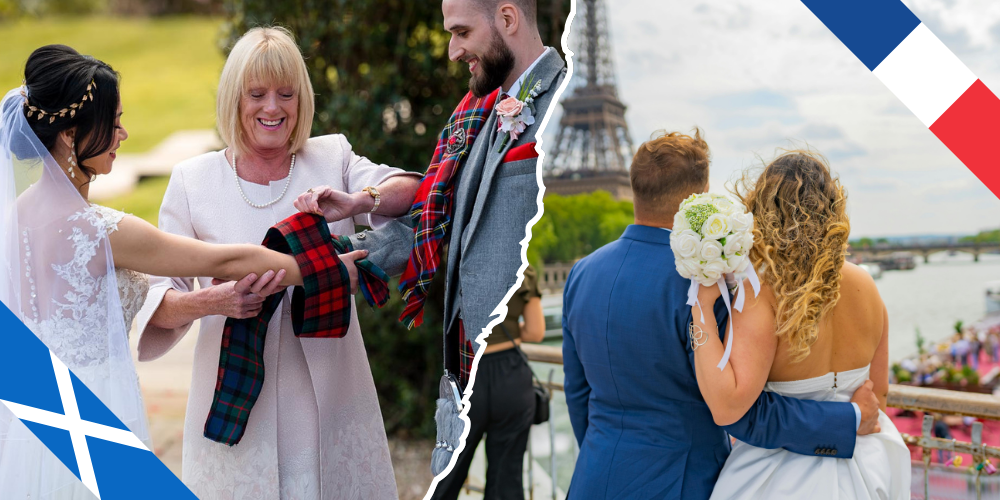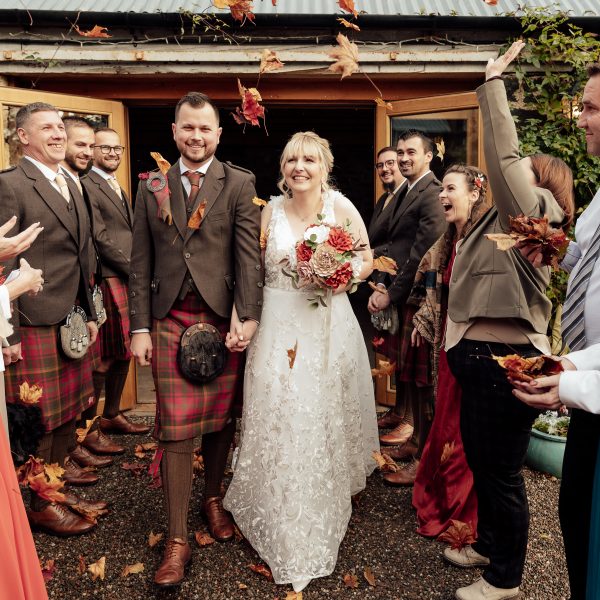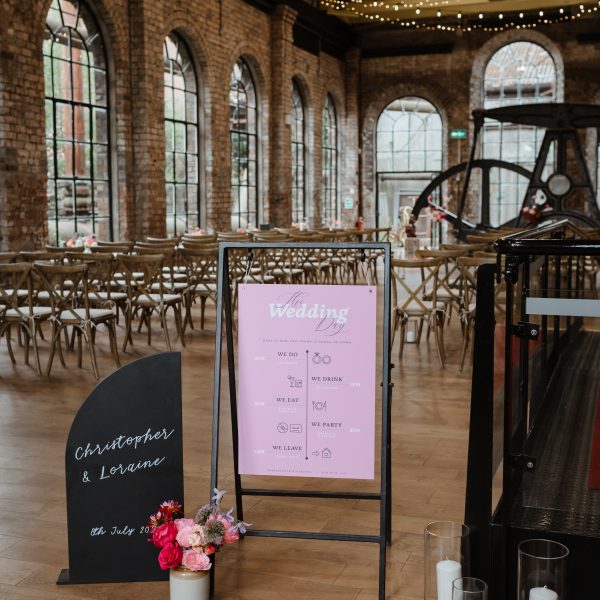When it comes to celebrating love and commitment, different cultures infuse their weddings with unique customs, rituals, and flavours. In this delightful exploration, we’ll compare the main differences between French and Scottish weddings.
Let’s get hitched!
Most French weddings take place in civil venues, such as town halls also called “Mairie”. The ceremony can take place in the morning but is usually around 3pm or 4pm.
Some couples wish to have a religious or symbolic ceremony following the civil one. It is possible to have both on the same day, but it depends on availability. It is not uncommon for couple to have a day dedicated to the civil ceremony followed by a small celebration afterwards. Then having another day dedicated to the religious ceremony followed by a larger celebration.
On the other hand, most Scottish weddings consist of a single ceremony. The couple decides on how they wish to get married – civil ceremony with registrar, religious ceremony or celebrant led ceremony.
On occasions, couples are getting their registrar ceremony on another day/location and then have a symbolic ceremony held by friends or family member. The time of the ceremony is usually in early afternoon around 2pm or 3pm. This may vary at the time of year when ceremony can be around 12pm or 1pm.
Civil ceremonies in France are not as personalised as in Scotland. One focuses more on the legalities such as reading of the articles of the Civil Code relating to the duties of a married couple. Question whether a marriage contract has been drawn up and finalised by the consent of the spouses. Whereas the other is more personalised in addition to the legal aspect of it. Readings of vows, symbolic gestures and other readings from guests can be included in the civil ceremony in Scotland. All of this is also possible in France but would be part of another entire ceremony – either religious or symbolic ceremony.
A toast to the newlywed couple!
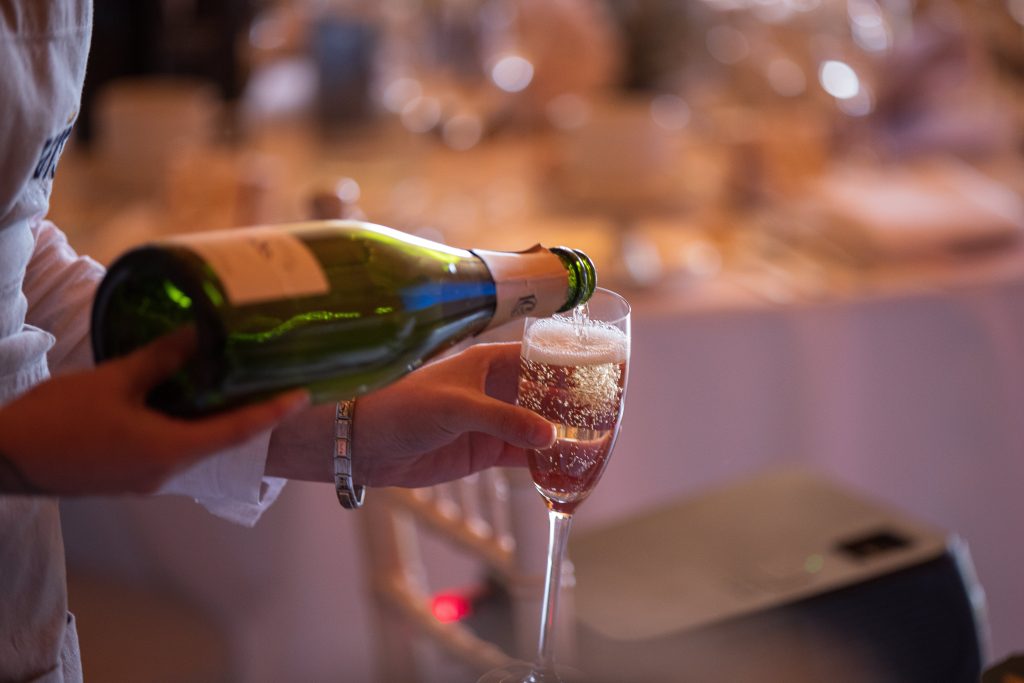
This part of the wedding is pretty common to both countries – it happens after the ceremony and is a moment to toast to the newlyweds while eating some canapés. The key difference is the guests attending this moment. In Scotland, every guest attends this part of the day as they are invited for the entire day. On the contrary in France, not all guests attending the Drinks Reception – also called “vin d’honneur” in French – will stay for the entire festivities.
Couple usually invite more guests, who are not as close as other guests (colleagues, friends of their parents, distant family etc) to share a moment with them for a couple of hours. A good half of the guests will leave before the meal starts. When receiving the invitation, guests will either have the full invitation or only the invitation for the ceremony and “vin d’honneur”. This has some similarities with Evening guests in Scotland, who are invited only for the evening festivities. However, evening guests stay for a longer period compare to the guests attending the drinks reception in France.
Here comes the feast!
Between French and Scottish food, the choice is quite large! It is pretty common for both countries to opt for a 3-course-meal or buffet options. But nothing is ever set in stone and everything varies with each couple’s needs.
In France, some old traditions are part of the day such as the “trou normand” which is an intercourse between the starter and the main or the main and the dessert. It consist of drinking a glass of Calvados with or without a sorbet to ease digestion for the remainder of the meal.
Let’s not forget cheese! A cheese course is a must when it comes to French weddings. Cheese platter are usually present at Scottish weddings as part of the evening food. But it is less expected compare to a French wedding.
One of the main difference between the two weddings style is the length of the meal. French weddings tend to last longer than Scottish weddings. On average, a meal can last around four hours against two hours for Scottish weddings. It is common to have entertainment and games in between courses in France, hence making the wedding meal longer than Scottish ones.
Time for a some cake!
When it comes to cake, many options are available to couples. The traditional wedding cake in France is a tower of croquembouche made of tiny “choux” filled with a delicious pastry cream all wrapped in golden caramel.
The wedding cake with 2 or 3 tier, more common in Scotland, is making his way to French weddings too.
However, on a less traditional way, cheese tower, macarons, cupcakes, various cakes are becoming more popular for either French or Scottish weddings.
A difference to note is when the cake is served. At French weddings, the cake comes usually after midnight. Whereas at Scottish weddings, the cake is cut around 8pm and served with the evening food around 10pm.
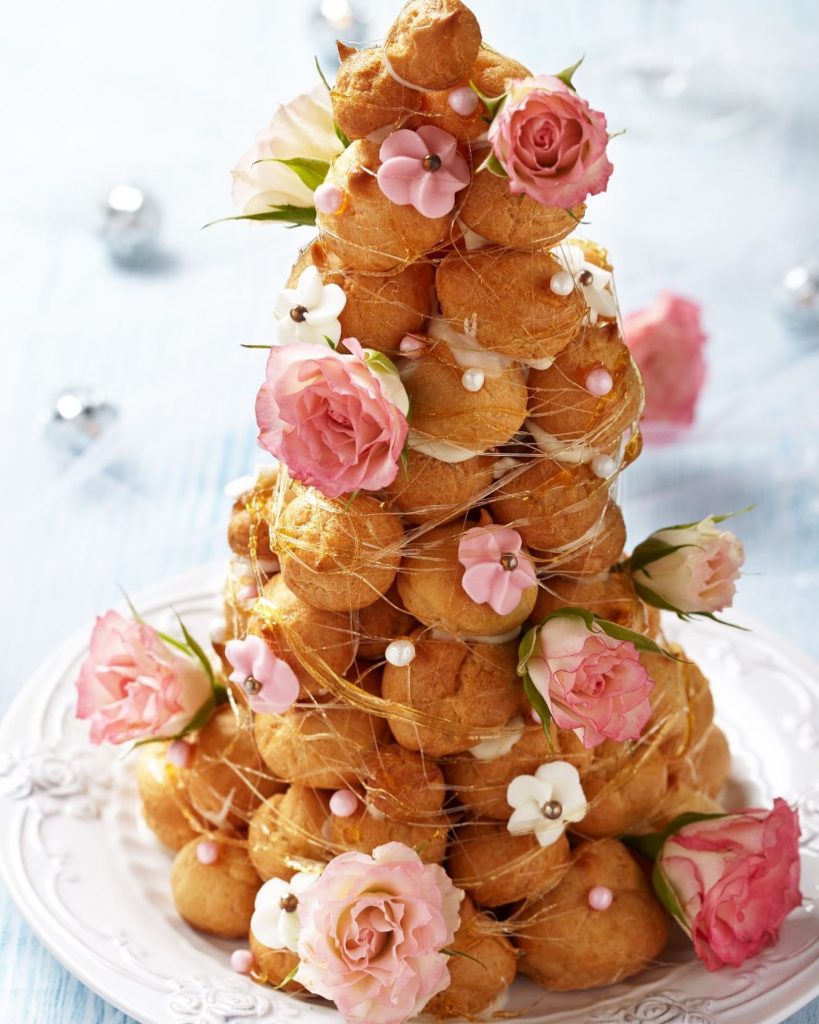
Get the party started!
There are many ways to entertain your guests at your wedding during the day and the evening. The most common entertainment in French wedding is hiring a DJ that will take care of the entire day. Games are organised either by the DJ or the wedding party to entertain the couple and their guests. Bands are also hired but it is less common than Scottish weddings.
I’ll detail it more in the next section but French wedding festivities are starting later than Scottish ones. Indeed, it is very common for the dancing to get started around midnight. A typical time for a Scottish wedding to end. Scottish wedding festivities usually starts between 7pm and 8pm, when French guests are headed to their tables for their meal.
Same day, not the same times
In general, French weddings are longer than Scottish ones as they are starting later in the day and finishing later. Here are typical timeline for both French and Scottish weddings:
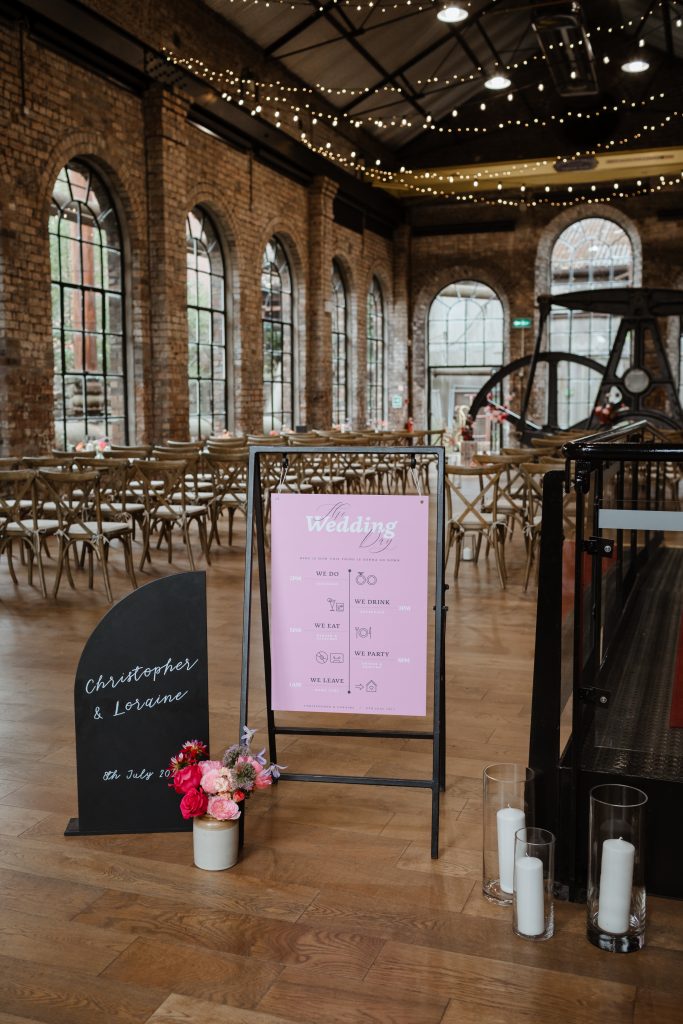
French Weddings:
- Ceremony – 3pm or 4pm
- Group shots/couple pictures – after there ceremony
- Drinks Reception – from 6pm
- Wedding Meal – from 8pm
- First Dance and Cake Cutting – after midnight
- End of the wedding – up to early hours (6am – 7am)
Scottish Weddings:
- Ceremony – Earliest 1pm – Latest 4pm
- Drinks Reception & group shots/couple pictures – after the ceremony
- Wedding Meal – Earliest 4pm – Latest 6pm
- First Dance and Cake Cutting – 8pm
- End of the wedding – usually midnight or 1am
Here are the main differences between French and Scottish weddings. This is without mentioning traditions for both countries, which are a subject for further blog articles.
Thank you very much for reading the entire article! Do not hesitate to reach out if you wish to hire a Wedding Planner and to book your Free Consultation to discuss your event with me! I look forward to chatting with you! 🙂
Photo Credits: Grant Richie, Elena Shashkina, Caro Weiss
